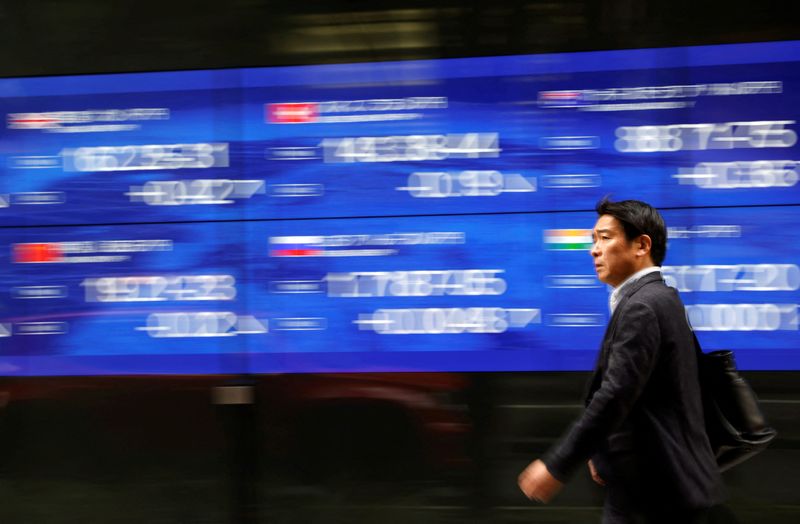By Jamie McGeever
(Reuters) - A look at the day ahead in Asian markets.
If anyone was wondering what it would take to puncture the U.S. economic 'soft landing' hopes that have fueled investors' risk appetite and gains across most markets this year, especially in tech and on Wall Street, they got their answer on Tuesday.
An unwelcome upside surprise in U.S. inflation triggered a surge in bond yields, pushed expectations of the first Fed rate cut out to June, juiced the dollar - most notably for a break above 150.00 yen - and tanked global stock prices.
The MSCI Asia ex-Japan index is now down four days in a row, and it could be five on Wednesday - the MSCI World index slumped 1.4% for its steepest decline since September, and the big three U.S. indices lost between 1.3% and 1.8%.
The regional calendar on Wednesday is light - wholesale price inflation in India and presidential elections in Indonesia are the main events - and Chinese markets are still closed for Lunar New Year, although the offshore yuan could sell off.
That's a potentially choppy mix of political risk, below-average liquidity and widespread 'risk off' sentiment across Asia on Wednesday following the tightening of financial conditions and big moves across many markets on Tuesday.
U.S. Treasury yields jumped as much as 20 basis points after figures showed that annual U.S. CPI inflation slowed to 3.1% in January and not the 2.9% economists had expected. Stocks tumbled.
The reaction of Japanese stocks will be particularly interesting after the dollar smashed through the psychologically important 150.00 yen barrier to trade within sight of the all-time high of just under 152.00 yen reached in November last year and October 2022.
The Nikkei played catch up on Tuesday following the long weekend and surged nearly 3% for its best day since November 2022. It goes into the open on Wednesday at a fresh 34-year peak and within 1000 points of printing a new all-time high.
But although the weak yen has been one of the most important catalysts for Japan's outperformance, its latest slide might take a back seat to Tuesday's global equity selloff.
On the data front, figures are expected to show India's wholesale price index rose 0.53% year-on-year in January, with strong gains in food prices offset by fuel deflation.
Wholesale prices have been flirting with deflation for almost a year, and another weak print on Wednesday could put the rupee under added downward pressure.
The Indonesian rupiah, meanwhile, may be sensitive to domestic politics as the country goes to the polls.
Defence minister Prabowo Subianto is frontrunner in the race to win power in the world's third-largest democracy, but it is unclear whether he is on track to get the simple majority needed to avoid a runoff.
Here are key developments that could provide more direction to markets on Wednesday:
- India wholesale inflation (January)

- India trade (January)
- Indonesia presidential elections
(By Jamie McGeever)